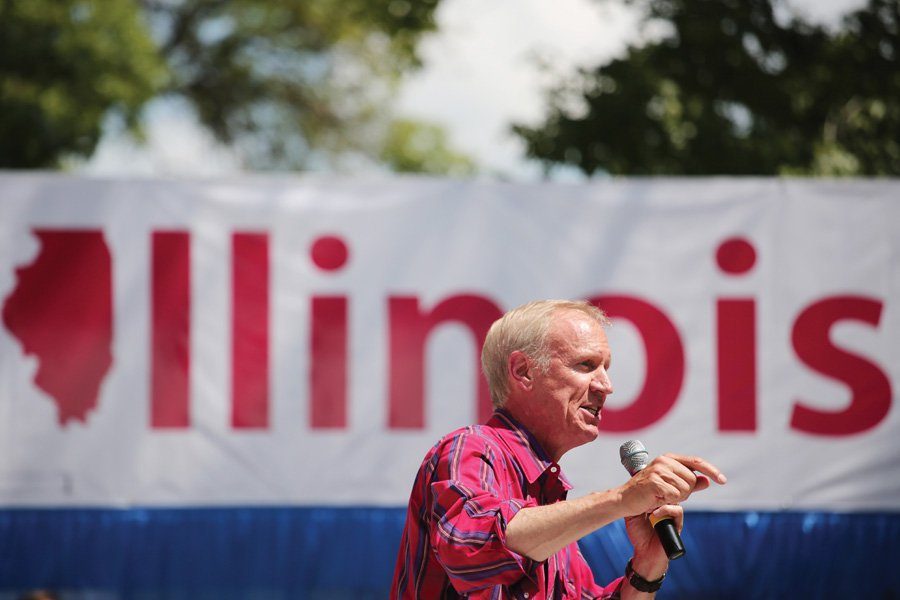Evanston stands to lose funds under proposed statewide property tax freeze
Anthony Souffle/Chicago Tribune/TNS
Gov. Bruce Rauner speaks at the Illinois State Fair in Springfield last year. Rauner has said he would support a property tax freeze in a budget address last week.
February 21, 2017
A proposed statewide property tax freeze could impact police and fire pension funds, city manager Wally Bobkiewicz said.
The property tax freeze has been floated by Gov. Bruce Rauner in response to a “grand bargain” set of bills designed to end the state budget impasse. In a budget address last week, Rauner said he would not support an increase in taxes on groceries and medicine included in the package of bills. Rauner also said he would not support a proposed income tax increase without a complementary property tax freeze.
A property tax freeze would make the income tax increase a little easier on residents, Rauner said.
“We need a permanent property tax freeze in Illinois, just like the one the House passed last month,” he said. “Over time, as our economy grows and revenues expand, any increase in the income tax could be stepped down — dedicating future surpluses to taxpayers, not more government spending.”
At an Administration and Public Works Committee meeting in October, aldermen were told by an actuarial firm hired by the city that both funds are both funded at under 50 percent. An actuarial firm hired by the city suggested adjusting the mortality tables for the pension plans.
Currently, the funded ratio for the fire plan is 43.6 percent and 46.6 percent for the police plan.
Bobkiewicz said the city is currently putting in more money into the funds than is required annually to try to overcome issues in fully funding the pensions.
“The prioritization of the council has in the past been to put more money aside for pensions to try to make up some of the deficits there over the years,” Bobkiewicz said. “Under a worse case scenario … one of the options may be to stop doing that in order to continue to fund current operations at the same level.”
Bobkiewicz said it was unclear whether the proposed increase in income taxes would benefit the city. Currently, Evanston keeps roughly 9 percent of the revenue raised in income tax, down from 10 percent in previous years according to Bobkiewicz.
If an increase in the income tax would allow the state to leave more of the revenue to municipalities, it could offset the potential negative impacts of a potential property tax freeze.
Overall, the city is choosing to “wait and see” until more specifics about the plan come out, Bobkiewicz said. Rauner has been criticized by state Democrats for not presenting a detailed budget plan.
State Sen. Daniel Biss (D-Evanston) said in a statement following Rauner’s address that the governor’s proposal includes “unpalatable options like harmful cuts to key programs and tax increases on the middle class.”
Bobkiewicz said he and other city officials are in contact with Evanston’s elected officials in the General Assembly. He and Mayor Elizabeth Tisdahl plan to go to Springfield in a few weeks with other municipal officials to discuss state funding issues further, Bobkiewicz said.
“It’s difficult to speculate because it has been so long since we’ve started having these discussions,” he said. “We are paying attention, and we want to make sure we are spending Evanston tax dollars responsible as always, but at this point we’re just going to continue to take a wait-and-see.”
Email: [email protected]
Twitter: @noracshelly


